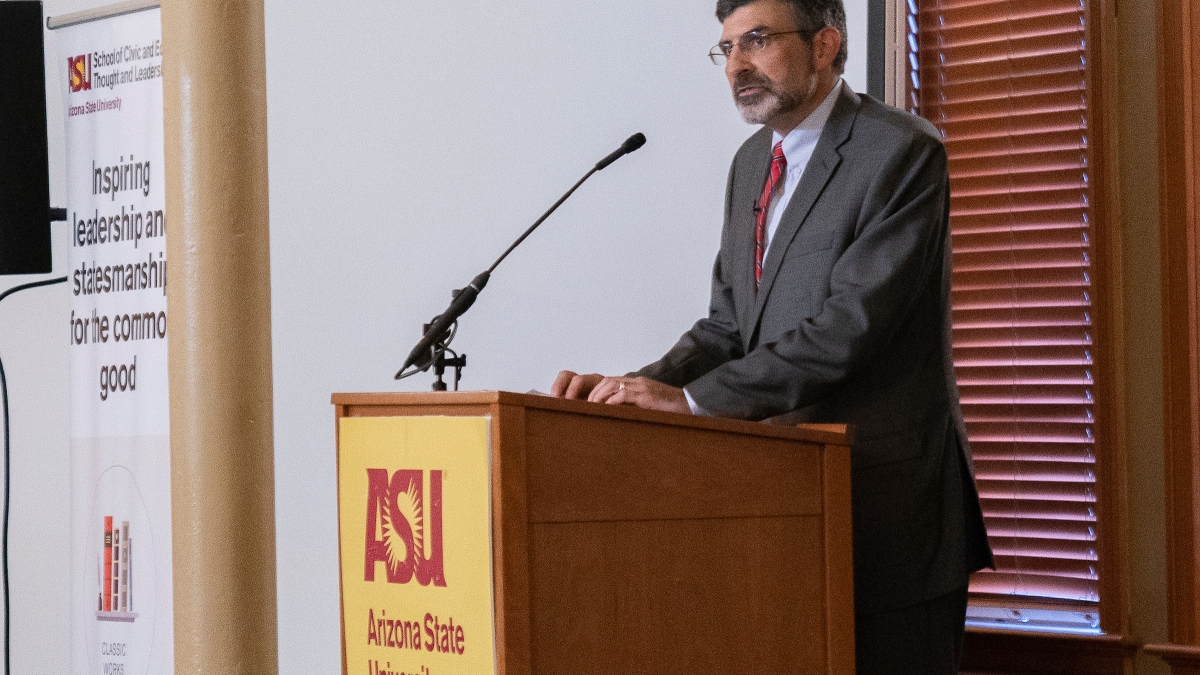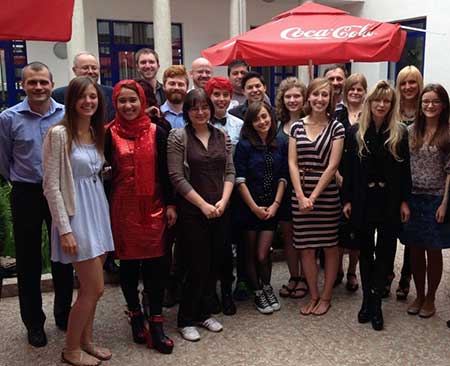ASU professors on U.S. interest in central Europe, Black Sea region

Paul Carrese speaks at an event hosted by ASU's School of Civic and Economic Thought and Leadership in January. Photo by Charlie Leight/ASU Now
In the 70 years since the signing of the North Atlantic Treaty established an international alliance to prevent future devastation like that which was wrought during the First and Second World Wars, threats to the liberal democratic way of life continue — from Russian military occupations to religious conflicts in Turkey to civil unrest in China.
This summer, Paul Carrese, founding director of Arizona State University’s School of Civic and Economic Thought and Leadership, addressed these and other issues of concern at the Black Sea and Balkans Security Forum in Romania.
“Both American leaders and the leaders of the Three Seas InitiativeThe Three Seas Initiative is a forum of 12 states in the European Union, located in Central and Eastern Europe, that aims to create a regional dialogue on a variety of questions affecting the member states. states know that it is in the enlightened self-interest of all the liberal democracies to support each other, globally, in an era of unprecedented global connectedness but also uncertainty and threats,” Carrese said.
The annual forum seeks to enhance the security cooperation as well as political and economic cooperation among a dozen states bordering the Baltic, Black and Adriatic seas. Other speakers included distinguished current and former diplomats from greater Europe and the U.S., current and former generals from NATO member states, scholars, institute directors and observers from NATO and the European Union.
Ileana Orlich, President’s Professor of Romanian studies and comparative literature in the School of International Letters and Cultures at ASU, was instrumental in helping to arrange ASU’s involvement in the forum. A native of Romania, Orlich first arrived at ASU as a graduate student in 1977. In 1998 she established the Romanian language program, with only 10 students. Since then, it has expanded into the largest Romanian studies program in the world and the only freestanding Romanian studies program in the U.S. In 2018, Orlich was honored with high distinction by the president of Romania, Klaus Werner Iohannis, for her efforts to promote the Romanian language and national identity abroad.

ASU President's Professor Ileana Orlich (first row, second from right) with the ASU summer study program in Cluj, Romania.
ASU Now asked Carrese and Orlich to provide some insight into the issues currently at play in central Europe and the Black Sea region.
Question: What were some topics of concern at the forum?
Carrese: I addressed the reasons why, as a matter of the grand strategy and foreign policy of these liberal democracies in central Europe, it is a very good idea to pursue a regional initiative on security cooperation and economic development from the Baltics to the Adriatic, including the states on and near the Black Sea. This makes great sense for these dozen or so states in central Europe, making plans for peaceful mutual development among states with shared principles, values, forms of government and market economies. This also is an important initiative given the threatening posture and actions of the Russian government under President Putin against liberal democracies in the region, and against other former states of the Soviet Union, from the Baltic states to Ukraine and Georgia.
Q: Why should Americans be concerned about security in the region today?
Carrese: Our security and prosperity have immensely benefitted from being the global leader of an alliance of liberal democracies since the 1940s. The U.S. has worked to expand the number and range of our partners in helping to provide for a more peaceful, stable and prosperous world over the past 75 years. NATO and the trans-Atlantic alliance more generally, to include the European Union, are international pillars of this U.S.-led effort to promote liberal democracy, economic prosperity and security that directly benefits America as well as other states and peoples. The Baltic, Black Sea and Adriatic states are members of NATO or the European Union or both. Serious threats to liberal democratic life in these states now are coming not only from the current Russian government but also from the governments of Iran (not very far from this region, especially given its intervention in Syria) and from China; and while China is seemingly far away from central Europe, it is a very large presence in global economic and security issues, including its current support of illiberal or anti-democratic policies of Russian and Iran.
Orlich: The Black Sea and the Bosphorus, which links the Black and Mediterranean seas, is of great strategic importance as a fault line between Western, Orthodox and Islamic civilizations. The rich history of the Black Sea goes back to the old Greek and Roman civilizations, the Byzantine control of the region and the exploits of the Ottoman Empire competing with Tsarist Russia for supremacy. Today’s Black Sea region remains the arena of conflicting interests for superpowers and regional powers. Putin’s Russia is reasserting itself after the collapse of the Soviet Union ended Russia’s time as a superpower. Russia is militarily involved in Ukraine and Syria and has occupied Crimea and strategic areas in Georgia. To counter that threat, the U.S. is emphasizing its relationship with Romania, a strong U.S. ally and member of NATO since 2004 and the European Union since 2007, and reasserting its presence in the Black Sea. Meanwhile, although a longtime member of NATO, Turkey has been moving away from the West and toward the Islamic world, testing its relationship with the U.S. and the European Union.
Q: How can ASU students benefit from faculty scholarship in this area?
Orlich: The forum, organized by the New Strategy Center based in Bucharest but connected with prestigious universities both in Romania and in the European Union, brings together scholars, high-ranking military personnel and diplomatic representatives to discuss this strategic fault line. ASU students have much to gain from the involvement of faculty at a time when Russia is reasserting itself militarily, Turkey is testing its secular institutions and the U.S. and European Union seek to support the Black Sea democracies born out of the collapse of the Soviet Union and the Eastern Bloc. Covering disciplines ranging from political science to religion, this is a robust academic debate with timely real-world consequences to which ASU can contribute and from which it can gain.
More Law, journalism and politics

Exhibit uses rare memorabilia to illustrate evolution of US presidential campaigns
After one of the most contentious elections in history, a new museum exhibit offers a historical perspective on the centuries-old…

TechTainment conference explores the crossroads of law, technology, entertainment
What protections do writers, actors, producers and others have from AI? Will changing laws around name, image and likeness (…

How to watch an election
Every election night, adrenaline pumps through newsrooms across the country as journalists take the pulse of democracy. We…